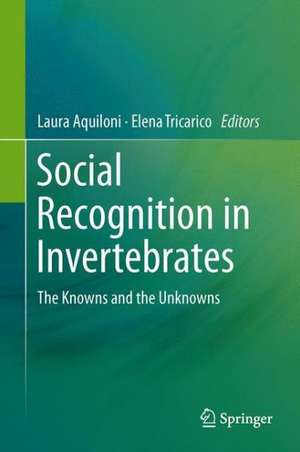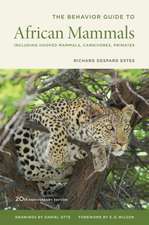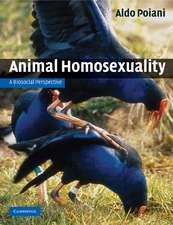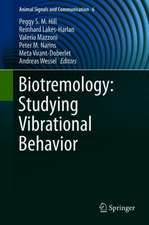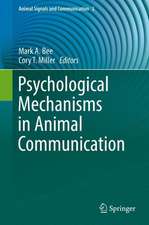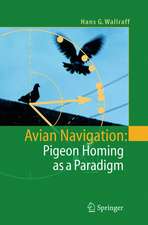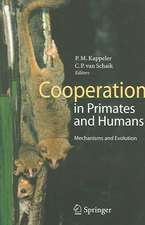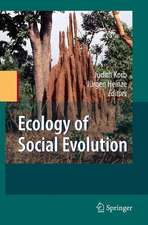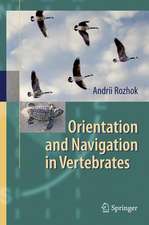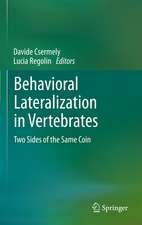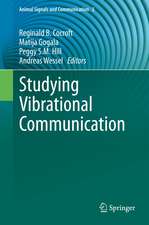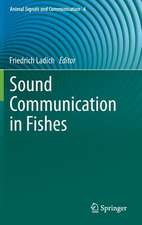Social Recognition in Invertebrates: The Knowns and the Unknowns
Editat de Laura Aquiloni, Elena Tricaricoen Limba Engleză Hardback – 10 iun 2015
| Toate formatele și edițiile | Preț | Express |
|---|---|---|
| Paperback (1) | 559.43 lei 38-44 zile | |
| Springer International Publishing – 17 oct 2016 | 559.43 lei 38-44 zile | |
| Hardback (1) | 570.41 lei 38-44 zile | |
| Springer International Publishing – 10 iun 2015 | 570.41 lei 38-44 zile |
Preț: 570.41 lei
Preț vechi: 713.01 lei
-20% Nou
Puncte Express: 856
Preț estimativ în valută:
109.15€ • 114.25$ • 90.85£
109.15€ • 114.25$ • 90.85£
Carte tipărită la comandă
Livrare economică 26 martie-01 aprilie
Preluare comenzi: 021 569.72.76
Specificații
ISBN-13: 9783319175980
ISBN-10: 331917598X
Pagini: 200
Ilustrații: XVI, 266 p. 34 illus.
Dimensiuni: 155 x 235 x 22 mm
Greutate: 0.58 kg
Ediția:2015
Editura: Springer International Publishing
Colecția Springer
Locul publicării:Cham, Switzerland
ISBN-10: 331917598X
Pagini: 200
Ilustrații: XVI, 266 p. 34 illus.
Dimensiuni: 155 x 235 x 22 mm
Greutate: 0.58 kg
Ediția:2015
Editura: Springer International Publishing
Colecția Springer
Locul publicării:Cham, Switzerland
Public țintă
ResearchCuprins
Presentation of “Social recognition in invertebrates”.- Social recognition in invertebrates: an introduction for the readers.- Social recognition in annelids and the evolution of social recognition and cognitive abilities by sexual selection.- Individual recognition in stomatopods.- To what extent can freshwater crayfish recognise other crayfish? Social Recognition in Hermit Crabs.- Social behavior and recognition in decapod shrimps, with emphasis on the Caridea.- Social behavior in amphipods – an overview.- Social recognition in the Arachnida.- Visual recognition in social wasps.- Nestmate recognition in eusocial insects: The honeybee as a model system.- Ontogeny of nestmate recognition in social hymenoptera.- Communication and Social Regulation in Termites.- Recognition mechanisms in the biparental burying beetle.
Recenzii
“This important book brings together chapters on a comprehensive range of invertebrate taxa, reviewing the evidence in each taxon for social recognition and mechanisms. … This book will encourage and enable further high-quality research in social recognition in invertebrates.” (Tristram D. Wyatt, The Quarterly Review of Biology, Vol. 92 (3), September, 2017)
Textul de pe ultima copertă
This book uses a wide range of case studies from different invertebrate taxa to describe the numerous forms of social recognition occurring in this large group of animals, and traces the evolution of this cognitive ability. The authors provide several examples of direct (i.e. the target of recognition is a conspecific) and indirect recognition (i.e. recognition of a reliable proxy rather than an individual, such as a den or a substrate), and discuss cases of familiar recognition (i.e. an animal remembers a conspecific but cannot tell what class it comes from or recognize its identity). Class-level recognition (i.e. an animal assigns a conspecific to an appropriate class of animals), and true individual recognition (i.e. an animal both identifies and recognizes a conspecific on an individual basis) are also addressed.
Caracteristici
The first book that synthesizes the wide recognition ability of invertebrates Presents a comprehensive survey of the latest research in invertebrate behavior and simultaneously attempts to reconstruct the evolution of social recognition from the category of familiar recognition to the categories of class-level and true individual recognition Allows the readers to appreciate how refined and complex invertebrates are in their ability to recognize a conspecific Includes supplementary material: sn.pub/extras
